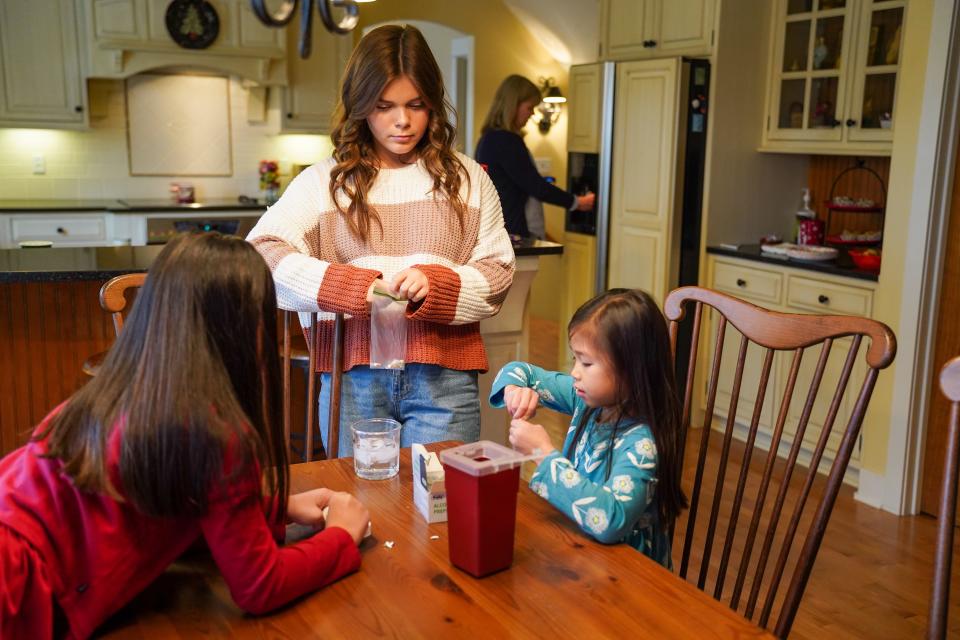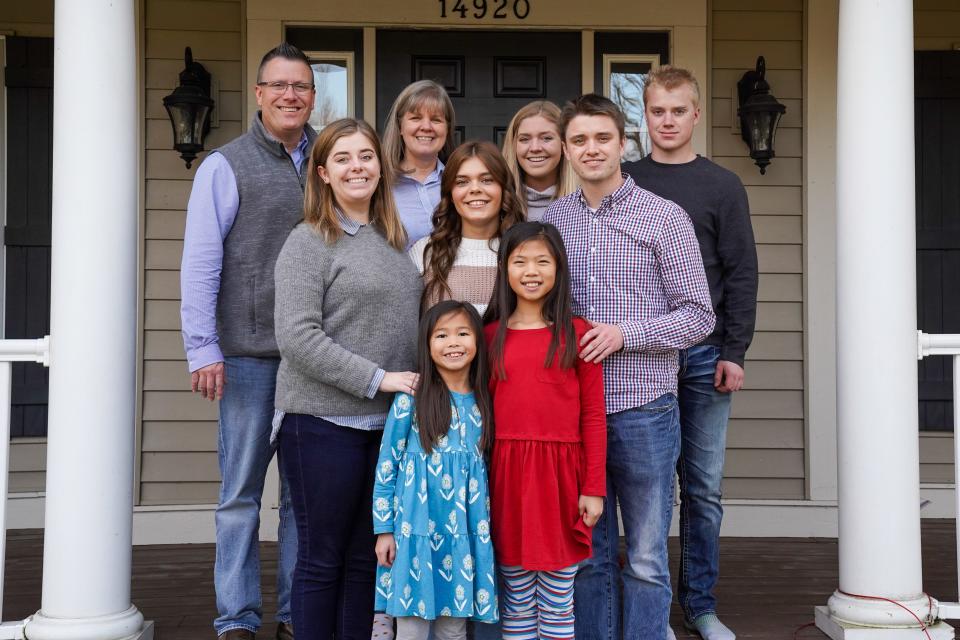From debilitating illness to a 'normal' life, new gene therapy treatment promises to transform rare disease
For the first time in her life, 19-year-old Antonela Baron can imagine what it might be not to be sick.
On Friday, a federal advisory panel recommended that the Food and Drug Administration approve a treatment that could rid Baron of her beta thalassemia, a blood disorder that leaves her needing monthly blood transfusions, daily drugs to remove excess iron from her body and exhaustion that often makes normal life challenging.
"It's really awesome," Baron said about the prospects for full FDA approval, which is expected to come by Aug. 19. "I thought I would never be able to not have thalessemia."
About 1,500 Americans have serious enough beta thalassemia to require regular blood transfusions, and about 20,000 more are born each year worldwide. Most of them are in countries where malaria is common, in South Asia, the Middle East, North Africa, and Southern Europe. (A single mutation in the betaglobin gene can help protect against malaria, while mutations inherited from both parents leads to beta thalassemia.)
Nearly all 63 patients in a research trial of beti-cel were able to stop regular transfusions after receiving gene therapy, according to data from bluebird bio, the Massachusetts-based company that makes it. Some of the patients received their one-time treatment seven years ago and remain transfusion-free.
In a trial of a different gene therapy for beta thalassemia, which reported results over the weekend, 42 out of 44 patients no longer needed transfusions. Vertex Pharmaceuticals and CRISPR Therapeutics expect to apply for FDA approval for their so-called exa-cel gene therapy before the end of the year.

Gene therapy, the ability to knock out or replace a disease-causing gene, is poised to transform treatments for many inherited conditions.
Blood disorders like beta thalassemia and the more common sickle cell disease are among the first likely to benefit, because with them, gene edits can be made outside the body, in blood that is withdrawn, "edited" and then reinserted.
"Beta thalassemia is almost the perfect disease to study gene therapy in," said Dr. Richard Colvin, bluebird's chief medical officer.
Baron, a psychology major, plans to sign up for the beti-cell treatment next spring after finishing her sophomore year at Cornerstone University in Grand Rapids, Michigan. She chose the school because it was close to the doctors and nurses who have cared for her since she was 7.
Her parents were given the option of entering Baron into the beti-cel trial three years ago, but they chose to wait until it was FDA-approved. Her parents worried the treatment would leave her infertile. Patients need to get chemotherapy before gene therapy to clear out diseased blood cells before replacing them with healthy ones.
But having gene therapy as an option will transform beta thalassemia from a manageable condition to a curable one for many more patients, said Katie Baron, Antonela's mother. She sits on bluebird's Patient Insights Council and has two younger daughters with beta thalassemia.
Although they're all accustomed to the medical regimen, she said, gene therapy would allow children like hers to "get to experience a normal normal that doesn't include a lifetime of transfusions and life-altering, life-threatening side effects."
The promise of gene therapy
It has taken decades of research for scientists and companies to get to the point of being able to contemplate offering gene therapies as part of routine care for some of the most dangerous and life-disrupting diseases.
The FDA has approved gene therapies for treating blood cancers, where immune cells are removed from the body, edited and returned, and a few eye diseases in which only the relative few genes in the eye would need to be edited.
Approval of a beta thalassemia gene therapy would be a significant step forward for the larger field, Colvin and other said.
The most serious safety concern with gene therapy – which the FDA advisory panel spent several hours discussing Friday – is the possibility that the treatment will lead to cancers. Other gene therapy trials have triggered blood cancers or changed cells in a few people in ways that make experts worry that tumors will follow.
In the end, the advisory panel, known as the Cellular, Tissue, and Gene Therapies Advisory Committee, decided that because the technology behind beti-cel differs somewhat from other gene therapies and none of the 63 patients in beti-cel clinical trials developed cancer, the risk for thalassemia patients is theoretical and worth taking. To make sure, bluebird plans to follow patients treated with beti-cel for 15 years.
Advisory committee members universally praised the therapy Friday.
"Impressive efficacy data. Minimal risk," committee chair Lisa Butterfield, a tumor immunologist with the Parker Institute for Cancer Immunotherapy at the University of California, San Francisco, said after casting her supportive vote.
"Life-changing for patients," said Jeannette Lee, a professor of biostatistics at the University of Arkansas for Medical Sciences.
"This gives a lot of hope to my community," said Navdeep Singh, a nurse practitioner at the University of Toledo and the patient representative on the committee.
In some ways, gene therapy is safer than the only other effective long-term treatment for beta thalassemia: a bone marrow transplant.
Transplant, usually done when a child is 2 or 3, has long been the first choice for patients who have a matched sibling donor.
But in those with more distant relations or a poorer match, there's a higher risk of graft-versus-host-disease, a life-threatening complication that can occur at any time in later life. Gene therapy cannot lead to graft-versus-host disease.
"This is beneficial for patients of all ages," Colvin said.
Costs and challenges
It's not clear how much bluebird will charge for beti-cel, but an independent private organization that evaluates drug costs, put the value of the one-time therapy at $2.1 million.
The company has been working with insurers for years to make sure their treatments are covered once approved.
Dr. David Rind, chief medical officer of the Boston-based Institute for Clinical and Economic Review, said his organization assigned such a high value because the therapy would replace the cost of regular transfusions and expensive chelation drugs. He hopes the high price tag eventually will come down and won't prevent patients from getting the therapy.
Rind, also an internist at Beth Israel Deaconess Medical Center in Boston, said that if he had an infant diagnosed with beta thalassemia today, he'd opt for gene therapy as soon as possible, to give that child a normal life.
If he had an older child who had already gotten used to monthly transfusions, though, he might wait a few years for the therapy to prove itself and the real risks to be understood, he said.
The ill effects of transfusions don't generally show up until adolescence, when the extra iron can stunt growth, so parents of grade schoolers have a little time to make a choice. Chemotherapy will also cause sterility, so parents may want to wait until their child is older and their eggs or sperm can be preserved.
"You can see people making different decisions on this," Rind said.
Seeking normalcy
Katie Baron had never heard of beta thalassemia when she and her husband, Randy, adopted Antonela, then 7, from an Albanian orphanage. Although her medical care had been adequate, the Barons, who already had four biological children, knew she would be much better off growing up with American medical care.
Caring for Antonela was more complicated than expected. But once the Barons figured out the drill, they decided to adopt two more girls with the disease, this time from China. Evelyn, now 10, arrived five years ago, and Lucy, now 8, has been a Baron for six.
Katie Baron said she was motivated by her religious faith. "We have a responsibility to care for orphans in their distress," she said. Randy works from home in information technology staffing, and her background as a teacher meant she has been able to home-school the children, whose health problems make it difficult for them to keep up with the pace of a typical school day.

But at least the girls have each other, their own support group.
"That's made a big difference for them," she said. "It normalizes something that's not anywhere close to normal."
Baron said she'll put off gene therapy for her younger girls until they can understand the consequences and can safely store their eggs so they can have their own biological children one day.
She has been grateful, though, to be a part of the gene therapy process, as a member of bluebird's patient advisory council. "It's been so incredibly meaningful to be involved on the ground level of something so monumental like this," she said.
Instead of focusing on the scary prognosis for beta thalassemia, Katie Baron said she deals with each day as it comes. "Today you're OK, and if you're not tomorrow, we'll cross that bridge when we come to it."
Contact Karen Weintraub at kweintraub@usatoday.com.
Health and patient safety coverage at USA TODAY is made possible in part by a grant from the Masimo Foundation for Ethics, Innovation and Competition in Healthcare. The Masimo Foundation does not provide editorial input.
This article originally appeared on USA TODAY: New gene therapy treatment promises to transform rare blood disorder

